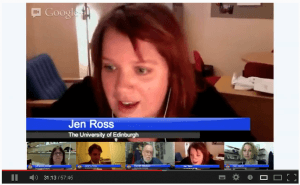Meditation on a MOOC – Week 1 (#edcmooc)
By Clive Young, on 10 February 2013
 Along with a few UCL colleagues I started the University of Edinburgh’s new MOOC (massive open online course) E-learning and Digital Cultures on 28 January. When I say ‘started’, I mean I logged in. I couldn’t engage at all in the first week as I was in the middle of OU marking, so I had to catch up with this material after ‘doing’ Week 2 (see next post). The weekly format is basically to watch a few short videos, read some academic papers then engage in the online discussion via forums in the Coursera platform, Twitter, Facebook, Google+ and personal blogs like this one. Having dropped out of other MOOCs early on I am determined to stick with this over the full four weeks and submit the final assignment.
Along with a few UCL colleagues I started the University of Edinburgh’s new MOOC (massive open online course) E-learning and Digital Cultures on 28 January. When I say ‘started’, I mean I logged in. I couldn’t engage at all in the first week as I was in the middle of OU marking, so I had to catch up with this material after ‘doing’ Week 2 (see next post). The weekly format is basically to watch a few short videos, read some academic papers then engage in the online discussion via forums in the Coursera platform, Twitter, Facebook, Google+ and personal blogs like this one. Having dropped out of other MOOCs early on I am determined to stick with this over the full four weeks and submit the final assignment.
The focus of the course – aimed to be at first year university level – is to consider the themes of technological utopias and dystopias in popular and digital culture, what it means to be human in a digital age, and in parallel relate this to the ways in which we think about online education.
The four short videos were interesting, three of them definitely dystopian, the other cute. What surprised me was the choice of the two introductory readings by Chandler (labelled ‘core’) and Dahlberg (labelled ‘advanced’), though, both dense academic reflections on the theoretical and methodological underpinning of the area. I wonder of the 40,000 signed up for the MOOC how many had actually (a) read, (b) assimilated and (c) critiqued these. A crude search on the Coursera forums found only 79 posts namechecked Chandler and 20 Dahlberg while there were 867 results for the four video titles. Not many, but I’m sure there was more on Twitter and the blogs.
I found both papers fascinating but needed time to read and assimilate. Both papers criticised the notion of ‘technological determinism‘, essentially that the development of technology itself would cause a better society to emerge. Such an approach was seen by both authors as simplistic or ‘reductionist‘, insensitive to “the complex interplay between multiple elements”. Technology itself “an indeterminate, messy, incoherent entity” is both created by society and impacts on it (ie is “both socially constituted and constituting”) in a multiplicity of non-linear and interconnected processes. Both papers were concerned with ‘agency‘; who has power in any process of change. Is it individuals, wider society, corporations, the capitalist system, ‘technology’ itself? Or to be ‘non-reductionist’ some indeterminate (indeterminable?) matrix of all these? I enjoyed both papers and some of the forum posts rightly picked up the point that ‘technological determinism’ is a big feature of discourse and investment throughout education.
The resources conclude with an oldish keynote by educational guru John Daniel who claimed in education technology could “increase access, raise quality and cut cost – all at the same time”, a sort of determinism perhaps but he also urges everyone to “think broadly about the use of technology and to seek balance in the way you apply it”. There was some other stuff (Prensky etc) but I ran out of time.
Had a quick look though the Courseara discussions but by the time I got there all the threads were dead! Instead I looked at the recording of the Google+ Hangout recording by the course tutors. This picked up the students’ feeling of being overwhelmed by the proliferation of threads and how to contribute when “everything had been said already”. The course team were following and contributing to specific threads e.g. the restrictions of binary definitions such as utopian/dystopian and digital natives/immigrants. But I’d missed these altogether. This made me think that MOOC forums need to be very well structured, a free-for-all doesn’t really work. There was also some discussion of the type of ‘digital artefact’ for the final assignment and what is an ‘ill-structured problem’. I’m sure I’ll return to that later!
3 Responses to “Meditation on a MOOC – Week 1 (#edcmooc)”
- 1
-
2
butlerceri wrote on 10 February 2013:
RT @UCL_ELE: Meditation on a MOOC – Week 1 (#edcmooc): Along with a few UCL colleagues I started the University … http://t.co/Ninu0qpC
-
3
Symbiotic MOOCs #edcmooc | Teaching 'E-learning and Digital Cultures' wrote on 27 February 2013:
[…] working together within the body of the MOOC as a whole. In some cases these have been groups of colleagues who have covenanted together to participate in the MOOC, and then to communicate, and to discuss […]
 Close
Close


Keep this going Clive – fascinating start. I suppose my first reaction is ‘glad I didn’t sign up’. Sounds, predictably, like a rather selective and dated set of resources and ill-organised aftermath. I can’t see how just throwing up some ‘stuff’ and providing ‘chat’ is doing anything more than replicating all that is bad in HE. and not exploring e-learning, as I know it. It’s all so 1980s and primitive.